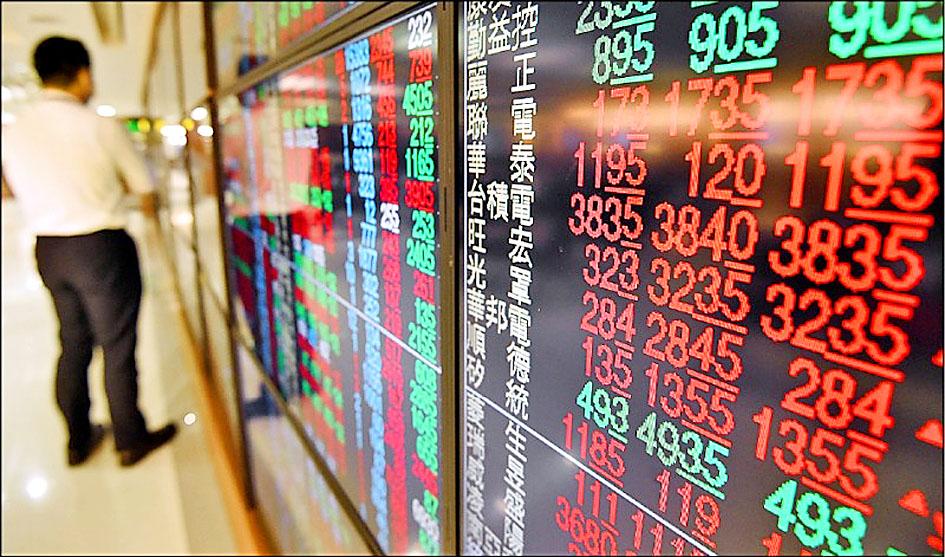The TAIEX yesterday closed at a record high after early losses were reversed by a late rally in Taiwan Semiconductor Manufacturing Co (TSMC, 台積電) shares on hopes that it will have positive news at its investor conference on Thursday, dealers said.
Other large-cap semiconductor shares also attracted buying late in the session and non-tech heavyweights benefited from strong liquidity, lending further support to the broader market, they said.
The TAIEX closed up 93.35 points, or 0.60 percent, at the day’s high of 15,557.30 on turnover of NT$323.597 billion (US$11.36 billion).

Photo: Taipei Times file photo
Foreign institutional investors sold a net NT$1.59 billion of shares, Taiwan Stock Exchange data showed.
“TSMC’s early losses largely reflected a fall [of 2.66 percent] in its American depositary receipt [ADR] on US markets on Friday [last week],” Mega International Investment Services Corp (兆豐國際投信) analyst Alex Huang (黃國偉) said.
“After the ADR losses were absorbed, investors looked to take advantage of TSMC’s early losses as the market is widely expecting the contract chipmaker to deliver positive leads on Thursday,” he said.
TSMC shares rose 0.69 percent to close at NT$584.
The market is expecting TSMC to forecast about a 15 percent year-on-year increase in sales this year.
Shares of United Microelectronics Corp (聯電), a smaller contract chipmaker, soared 4.99 percent to close at NT$50 on the back of solid demand for 8-inch wafers, which are the company’s major products.
Shares of iPhone assembler Hon Hai Precision Industry Co (鴻海精密) fell 0.46 percent to close at NT$107.5, but those of Largan Precision Co (大立光), a supplier of smartphone camera lenses to Apple Inc, rose 0.16 percent to close at NT$3,045.
“The market has repeatedly hit new highs because of all the liquidity out there,” Huang said. “Those funds not only propped up the mainstream tech sector today, but also select old economy stocks, especially petrochemical stocks in Formosa Plastics Group [FPG, 台塑集團].”
Among FPG companies, Nan Ya Plastics Corp (南亞塑膠) shares rose 2.34 percent to 74.4 and Formosa Plastics Corp (台灣塑膠) shares gained 1.02 percent to close at NT$99.
In the shipping sector, which continued to benefit from rising freight rates, shares of Evergreen Marine Corp (Taiwan) Ltd (長榮海運), the nation’s largest shipping company, rose 5.83 percent to NT$42.65 and those of Yang Ming Marine Transport Corp (陽明海運) added 4.58 percent to close at NT$28.55.
The financial sector was also boosted by late-session buying and gained 0.19 percent.
Mega Financial Holding Co (兆豐金控) shares closed 0.17 percent higher at NT$30.05, Yuanta Financial Holding Co (元大金控) shares gained 2.58 percent to NT$21.9 and China Development Financial Holding Corp (中華開發金控) shares surged 3.19 percent to close at NT$9.71.

Taiwan’s rapidly aging population is fueling a sharp increase in homes occupied solely by elderly people, a trend that is reshaping the nation’s housing market and social fabric, real-estate brokers said yesterday. About 850,000 residences were occupied by elderly people in the first quarter, including 655,000 that housed only one resident, the Ministry of the Interior said. The figures have nearly doubled from a decade earlier, Great Home Realty Co (大家房屋) said, as people aged 65 and older now make up 20.8 percent of the population. “The so-called silver tsunami represents more than just a demographic shift — it could fundamentally redefine the

The US government on Wednesday sanctioned more than two dozen companies in China, Turkey and the United Arab Emirates, including offshoots of a US chip firm, accusing the businesses of providing illicit support to Iran’s military or proxies. The US Department of Commerce included two subsidiaries of US-based chip distributor Arrow Electronics Inc (艾睿電子) on its so-called entity list published on the federal register for facilitating purchases by Iran’s proxies of US tech. Arrow spokesman John Hourigan said that the subsidiaries have been operating in full compliance with US export control regulations and his company is discussing with the US Bureau of

Businesses across the global semiconductor supply chain are bracing themselves for disruptions from an escalating trade war, after China imposed curbs on rare earth mineral exports and the US responded with additional tariffs and restrictions on software sales to the Asian nation. China’s restrictions, the most targeted move yet to limit supplies of rare earth materials, represent the first major attempt by Beijing to exercise long-arm jurisdiction over foreign companies to target the semiconductor industry, threatening to stall the chips powering the artificial intelligence (AI) boom. They prompted US President Donald Trump on Friday to announce that he would impose an additional

China Airlines Ltd (CAL, 中華航空) said it expects peak season effects in the fourth quarter to continue to boost demand for passenger flights and cargo services, after reporting its second-highest-ever September sales on Monday. The carrier said it posted NT$15.88 billion (US$517 million) in consolidated sales last month, trailing only September last year’s NT$16.01 billion. Last month, CAL generated NT$8.77 billion from its passenger flights and NT$5.37 billion from cargo services, it said. In the first nine months of this year, the carrier posted NT$154.93 billion in cumulative sales, up 2.62 percent from a year earlier, marking the second-highest level for the January-September